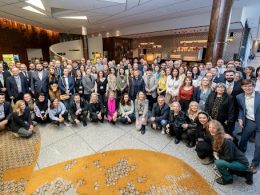Circularity and Green Agenda
Every year, on March 22nd, the world observes World Water Day, an international event dedicated to raising awareness about the significance of water and the urgent need for its sustainable management. Water is essential for agriculture, industry, and maintaining the balance of natural habitats. However, despite all its essential significance, the globe is still ravaged by significant water issues. Climate change, human expansion, pollution, and excessive use of resources are putting water systems to their limits, testing environmental and human sustainability. Circular thinking in water management is the answer to such challenges and puts the Green Agenda at the forefront of the world.
A circular system, reimagines water management on the basis of reduction, reuse, and recycling. Instead of treating wastewater as a problem, circularity sees wastewater as an asset to treat and recycle back into another process. That is the mindset needed to prevent water scarcity, limit pollution, and enable more sustainable economic systems. Several cities and corporations around the globe already use new technologies to recycle wastewater for irrigation, industrial processes, and even drinking. These efforts not only conserve water but also decrease the energy consumption involved in treatment and supply, thus lesser carbon emissions.
Water circularity is inherently linked to the overall principles of the Green Agenda in the way that it seeks to establish a sustainable future through climate action, resource efficiency, and safeguarding the environment. Sustainable water management contributes to climate resilience by reducing the reliance on freshwater, maintaining biodiversity, and enhancing the resilience of ecosystems to adjust to modified environmental conditions. It also assists in solving climate change because energy consumption and greenhouse gas emissions are typically high with inefficient water systems. By investing in circular solutions, societies can move towards a more sustainable equilibrium between human needs and nature.
Agriculture, as the largest consumer of freshwater globally, can benefit tremendously from circular water management. Traditional practices of irrigation have the tendency to cause high water consumption and land erosion, but the use of techniques such as drip irrigation, rainwater harvesting, and regenerative agriculture can make a huge difference in terms of efficiency. Similarly, water-intensive sectors such as textiles, food processing, and power generation can reduce their environmental footprint through the adoption of recycling plants for water. Cities must also update their water use plan by adopting green infrastructure, such as wetlands and permeable surfaces, to store and filter water naturally, without waste and with a reduced risk of urban flooding.
The transition to a circular water economy requires concerted effort at the government, industry, and individual levels. Policymakers must establish rules and incentives that render water reuse and conservation favorable, while corporations must integrate sustainability into their processes. At the community level, public perception regarding judicious water use can be altered through awareness campaigns and education programs. Individuals can also contribute by adopting simple habits, such as reducing water waste at home, replacing water-guzzling appliances with water-saving ones, and investing in firms that emphasize sustainability.
World Water Day serves as a reminder of the importance of water and the realization that what we do with this precious resource will define the future of our planet. The journey toward a greener world involves the embracing of circularity, not just in water management but in everything related to environmental care. As we continue pushing the Green Agenda, we need to do better than short-term fixes and adhere to systemic alterations that guarantee that water is accessible, clean, and plenty for generations to follow. Together, we can reverse the trend of water scarcity and shape a future in which water is respected, cherished, and managed sustainably.

Build Green Group
BGG Albania












